
VOL. I NO. 51 REG NO. L5015 DELHI, THURSDAY SEPTEMBER 2, 1943.

|
Ominous news for the Japs in Burma and Malaya came out of London this week with the announcement of the creation of a new United Nations' Southeast Asia Command and the naming of Lord Louis Mountbatten, famed British Chief of Combined Operations and father of the dreaded British Commandos, as Supreme Commander.
Although no direct connection was made between the new command an the Quebec conferences, no one appears to have any doubt that Mountbatten's appointment has resulted from extensive plans for intensified action against the Japs, particularly in Burma, which have been drawn up at Quebec by the High Commands of the United Nations. As an indication of increased importance for the Theater and a promise of sharply increased reinforcements in men and materials, the move was greeted with rejoicing by American as well as British officers and men of India and Burma.
Some disappointment was expressed by Americans that one of their own countrymen, particularly Lt. Gen. Joseph W. Stilwell, could not have been given the command. They realized, however, that it simply was not in the books. With Gen. Douglas MacArthur in command in the Southwest Pacific and Gen. Dwight Eisenhower the Allied leader in Sicily, and with Britain's stake in Burma and Malay greater than that of any other nation, it was realized in advance that the new commander would have to be from the United Kingdom. China is not included in the Southeast Asia sphere of operations.
Mountbatten's appointment, however, was received first as a surprise and than as a cause for rejoicing. As Chief of Combined Operations, Mountbatten has been the moving spirit behind the training and operations of the Commandos, and as such has won a world-wide reputation for carefully coordinated but extremely aggressive land-sea operations, if, as many hold, the sea route to Burma and Malaya is the only feasible route of attack against the Japs, most observers agree that no more experienced or qualified officer could have been selected to plan and lead the assault.
Immediately following the announcement of his appointment, Mountbatten flew to Washington, where he conferred with high U.S. military and naval chiefs. he has announced that he will leave very shortly for India and will visit Chungking for a conference with Generalissimo Chiang Kai-shek.
It has also been announced that Mountbatten will have a British Chief of Staff, who already has been selected but whose name has not been announced.
|
Bombers of the 10th Air Force stole the show again this past week. The P-40's were tucked away, pending a ceiling of more than 10 feet. However, the two-fan and four-fan boys hitched up their britches and went to work in dead earnest to make up for the little brother. Even they had to knock off for a couple of days at the start of the week until the liquid sunshine let up a little. They did all right the rest of the week. A Gallup poll of Akyab and Myitkyina would prove that without any question.
The market was bearish on Jap railroad shares as a result of their activities. Current and fixed assets were liquidated right and left. B-24's made the junkman happy at Pyawbwe, south of Mandalay, on the 24th. They slapped the rail yards there with everything in the book. One large explosion sent smoke 1,000 feet in the air. B-25's were making things miserable for the Nips in central Burma at the same time. Little yellow men are still trying to sort out track, rolling stock and engine sheds at Kanbalu and Thityabin.
Both the mediums and the heavies took turns plastering Thazi Junction in central Burma on the 27th. It was upsadaisy for several buildings surrounding the yards including one large warehouse. Ditto for tracks and rolling stock.
Haymaker of the week was at Akyab, although residents of Myitkyina might dispute it. Smoke Gets In Your Eyes was the No. 1 tune on the Akyab hit parade Saturday night. B-25's and B-24's furnished the accompaniment. The billeting officer there is going to be busy finding new quarters for Nip troops; that is, those that are left. He might look up the places that the ack-ack crews lived in - they won't be needing them anymore. The main jetty and adjacent buildings need extensive repairs, also, after the direct hits they tried to absorb. The RAF followed our crews in on a Saturday night, and they had no trouble finding the target, thanks to the two large fires still burning in the town. In appreciation, they mentioned the fact in their communiqu the next day.
Myitkyina got it the 29th. Both mediums and heavies dropped more than 40 tons of bombs on the rail yards and other installations there. B-24's dropped 19 tons of demos and leveled several enemy-occupied buildings. B-25's dropped the rest. Result: No more railroad station and many adjacent buildings, the tracks look like pretzels and X marks the rolling stock. One flight got 40 freight cars among other things in its attack.
At the same time, other B-24's were going off by ones and twos to raise a little hell. There was heavy damage and a fire left burning at Monywa. Kalewa, in central Burma, is short a large warehouse. One of the heavies hit the barracks area at Kyaukpyu, Ramree island, on the southwestern coast. The crew reported excellent results with all bombs in the target area.
'CHUTE PARTY NEARS CIVILIZATION
Eric Sevareid's Own Story Transmitted By Wireless Hand-Set To War Correspondent
By A. V. RAVENHOLT United Press War Correspondent
INDIA AIR BASE - Twenty men who parachuted from a crippled transport plane into the wilds of the India-Burma border on Aug. 2 are approaching civilization with three U.S. Medical Corps men who parachuted to their aid.
The party includes the plane's radio operator, Sgt. Walter Oswald, who is suffering from a broken leg and is being carried over the trail to civilization. The men have been supplied by a "flying grocery store" from the Transport Command base. Co-pilot Charles William Felix, of Compton, Calif., was killed in the crash.
At this end their is an ambulance plane waiting at the closest airport to fly the survivors to an Army hospital. Gen. Edward Alexander has sent Lt. Col. Donald C. Flickinger, who bailed out of a rescue plane to aid the survivors, the following message: "Good luck, good going. I will send you anything you want except pianos and violins I take it morale is good. We are greatly relieved at the safety of your party. Let me know if you want anything else." At one time a hot and complete meal, including chicken will all the finishings, was dropped to the party by parachute.
SURVIVOR'S STORY
In a plane which circled over the line of march of the survivors and rescuers enroute to civilization, I saw ridge upon ridge in the green-clad mountains and spotted a few villages. I saw narrow, precipitous trails winding along the side of cliffs, on one of which was the party. With the help of the navigator, Lt. Leon W. Cannon, 26, and the radio operator, Pfc. Samuel Dinerman, 25, I talked with Eric Sevareid, of the Columbia Broadcasting System, one of the survivors. Here is the story Sevareid told me, grinding it out on a hand-crank wireless in the middle of a mountain village:
"The party is in good shape physically and morally because of the medical skill and leadership of Col. Flickering and the painstaking preparations of Philip Adams, young British political officer who organized the guns, guards, pack bearers and camps for us on his way in with two American soldiers.
"Gen. Edward Alexander, commanding general of the ATC in India, sent a plane each day, dropping salt for the villagers and supplies for us. We got a Calcutta newspaper only two days old. The daily appearance of the planes reminded the villagers that we were not abandoned, and Adams helped to keep them under control.
"The last danger we had was when we walked through dark, damp paths which are famous as an ambush. The guards went through first and we followed with guns in hand. The bearers have been grand. They are carrying Sgt. Walter Oswald, who is suffering from a broken leg, on a bamboo chair fashioned by two Chinese officers. This is the most incredible feat I have ever seen. One Chinese collapsed and is being carried likewise.
"Many of us are covered with insect bites and sores, but nothing serious has happened except for heat exhaustion on my part yesterday. The civilians are standing up with the soldiers.
STORY OF CRASH
"At 9 a.m. on August 2, the baggage was thrown out. At 9:15 the pilot ordered us to jump since the plane refused to climb on one motor. Davies went first, followed by four others. I was about to go when a peak came up directly under me. Then we went over as the pilot-less plane began to spin down. As my chute opened I saw the plane explode right before me. I jumped from about 500 feet. If I had delayed five seconds more I would have crashed with the plane. I drifted rapidly toward the flames and was uttering a prayer I would not arrive there. Then a gust of wind blew me into the hillside and I rolled over and over through dense brush, and when it was all over, I found I was not hurt.
"Then came a moment of panic as I realized I did not know my whereabouts and my total equipment was one penknife. I found the plane's radio operator nearby with a broken leg and tried to bandage it with the silk from the chute. He hobbled to the wreck where we sat exhausted. In an hour a plane appeared, the radio operator having stuck to his radio till the last possible moment, repeating our position.
VILLAGERS FRIENDLY
"Gradually the party collected on a trail near the village. Davies' group had landed over on the mountain. I heard villagers yelling on the trail while I was hunting for a dropped chute bag in the brush. I ran to the pilot who had a gun, but the hillmen came bearing food and drinks. They helped us, and took us back to the village. They killed goats and pigs for us, and brought in our chute bags. The villagers, some of which are famous killers in the hills, now are devoted friends.
"Towards sundown on the first day, Col. Flickering, Sgt, Passey and Cpl. McKenzie bailed out of the rescue plane in answer to our panels asking for medical aid.
"They didn't have to jump in this wilderness and I confess I ran to them on the hillside with tears of relief and gratitude in my eyes.
"Toward midnight, Davies' group arrived in the pouring rain, guided by bearers with torches. Four days later, Cpl. Lemon, who was missing, was brought in. He had hidden in the brush because of fear. All were saved except our co-pilot, Lt. Charles William Felix whose body was found under the wreck. He was wrapped in a chute, and was buried there. The following Sunday, we erected a cross and had services to his memory.
"The tired cranking machine can send no more." - Eric Sevareid.
 GETS SOLDIER'S MEDAL
GETS SOLDIER'S MEDAL
By S/Sgt. ROBERT E. BADGER
CHINA AIR BASE - T/Sgt. Brainard B. Ferguson, who hails from Rock Hill, South Carolina, is the first member of this heavy bombardment group to be awarded the Soldier's Medal.
T/Sgt. Ferguson, a quiet unassuming fellow, was serving as aerial engineer on a bomber which had damaged its nose wheel while taking off on a mission. The pilot, red-headed Lt. Arthur D. Karp, courageously continued on the mission despite the fact that speed and safety were greatly reduced by the dangling nose wheel.
T/Sgt. Ferguson volunteered to cut away the wheel while flying at an altitude of 17,000 feet even though the job involved working without oxygen. To release the wheel it was necessary to work through the opened landing gear recess for a large portion of the time on going to the target area.
Finally, after much diligent effort, the wheel was loosened sufficiently for T/Sgt. Ferguson to suspend himself by his arms without parachute through the opening, and by jumping on the wheel, he was able to jar it free from the plane.
His heroic act and ability to sustain an initial courage over a long period of time enabled the plane to complete its mission and land without serious damage.
Lt. Karp's accomplishment in flying the damaged plane to the target area and back to its home base without injury or loss of personnel earned him the Air Medal (Oak Leaf Cluster). The citation awarding him the medal declared: "Lieutenant Karp throughout this mission displayed fine piloting technique and thorough knowledge of the flying characteristics of his plane." His home is in New York City.
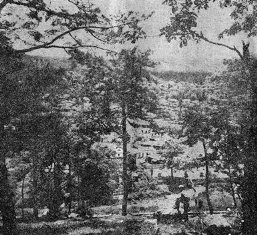 Looks like home, doesn't it? In fact, it could be Pennsylvania or Massachusetts or Oregon or Oklahoma.
In the distance is the little town near which the rest camp is located. In the foreground is Cpl.
Herbert Seckman, lucky guy.
Looks like home, doesn't it? In fact, it could be Pennsylvania or Massachusetts or Oregon or Oklahoma.
In the distance is the little town near which the rest camp is located. In the foreground is Cpl.
Herbert Seckman, lucky guy.
|
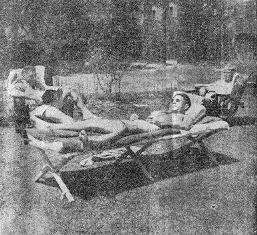 The quiet life. After dodging the blistering Indian sun for months, S/Sgt. Stephen P. Mileff gets ambitious
about a sun tan while Sgt. Mel Grimes and Cpl. James Moore catch up on their reading. It's not Broadway, but
it's a change.
The quiet life. After dodging the blistering Indian sun for months, S/Sgt. Stephen P. Mileff gets ambitious
about a sun tan while Sgt. Mel Grimes and Cpl. James Moore catch up on their reading. It's not Broadway, but
it's a change.
|
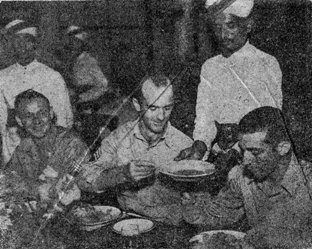 What, no corned willie? Bearded and turbaned bearers flit around while G.I.'s toss it down in a style
to which they have long grown unaccustomed. S/Sgt. Kenneth McCarron helps himself to the gravy while
T/Sgt. Major Blankenship looks on and Sgt. Bernard Pritzer concentrates on eating.
What, no corned willie? Bearded and turbaned bearers flit around while G.I.'s toss it down in a style
to which they have long grown unaccustomed. S/Sgt. Kenneth McCarron helps himself to the gravy while
T/Sgt. Major Blankenship looks on and Sgt. Bernard Pritzer concentrates on eating.
|
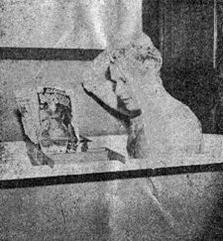 Tops in gold-bricking. Back home you can breakfast in bed, but only in India could S/Sgt. Stanley Strout
enjoy the luxury of being shaved in bed while reading last month's morning paper.
Tops in gold-bricking. Back home you can breakfast in bed, but only in India could S/Sgt. Stanley Strout
enjoy the luxury of being shaved in bed while reading last month's morning paper.
|
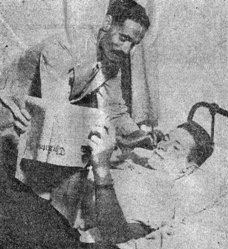 Two birds with one stone. Sgt. Irwin Kalena washes off the memory of lowland heat in a real bathtub and
further chills his blood by reading a thriller-diller mystery mag.
Two birds with one stone. Sgt. Irwin Kalena washes off the memory of lowland heat in a real bathtub and
further chills his blood by reading a thriller-diller mystery mag.
|
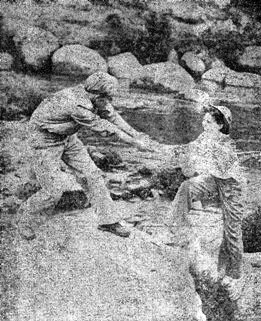 Chivalry is not dead. Pfc. Fenner C. Swanner extends a willing hand to Lt. Kay Kurka, ANC, as they spend an outdoor afternoon gulping in fresh air and stretching the old muscles.
Chivalry is not dead. Pfc. Fenner C. Swanner extends a willing hand to Lt. Kay Kurka, ANC, as they spend an outdoor afternoon gulping in fresh air and stretching the old muscles.
|
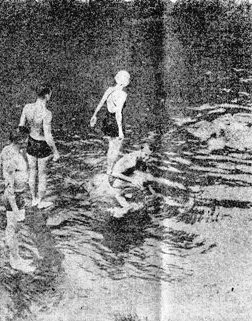 The old swimming hole. Left to right, Cpl. Jasper Clark, S/Sgt. Stanley Strout, Cpl. James S. Moore and
Pfc. Gus Connanze (in the water) cluster around Betty Healy, ARC. Who wouldn't?
The old swimming hole. Left to right, Cpl. Jasper Clark, S/Sgt. Stanley Strout, Cpl. James S. Moore and
Pfc. Gus Connanze (in the water) cluster around Betty Healy, ARC. Who wouldn't?
|
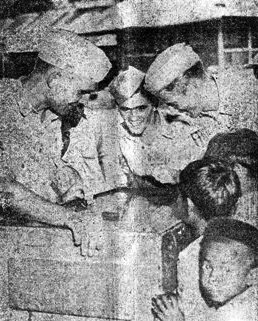 American influence. A pin-ball machine turns up from nowhere, and Sgt. Charles Lamb, Cpl. Herbert Seckman
and S/Sgt. George Wright try their luck while Indian kids look on, wonderingly.
American influence. A pin-ball machine turns up from nowhere, and Sgt. Charles Lamb, Cpl. Herbert Seckman
and S/Sgt. George Wright try their luck while Indian kids look on, wonderingly.
|
14th AIR FORCE DOWNS 78 JAP PLANES
|
HEADQUARTERS 14TH USAAF - Maj. Gen. Claire Chennault gave his answer to the Jap air force boast that it was going to drive the 14th Air Force out of Free China last week, when his heavy Consolidated B-24's, B-25 medium bombers and "hit and run" P-40 fighters teamed up to give Mr. Nip an insulting seven day lashing. Chennault's men accounted for the destruction of 78 enemy planes and 29 others probably destroyed, while bombing runs were successfully completed on all missions, with military installations on the Hankow waterfront and warehouse district destroyed, as well as installations in the Hanan, Wuchang, Hong Kong, Canton, Kowloon and Tien Ho airdromes. Despite Japanese resistance, 14th Air Force losses were but eight planes.
|
Four-engined B-24's, unescorted, lived up to their new name of "heavy interceptors," accounting for 35 confirmed Zeros, nine probables and two damaged when they were attacked by about 50 Japanese fighters while making a run up the west bank of the Yangtze River, strewing heavy explosive bombs along the four-mile warehouse dock area.
Despite the heavy Jap resistance, the liberators laid their bombs on the installation in this "Chicago of China" which the Jap used to equip forces in central and upper Yangtze areas. Forty-five minutes after the B-24's struck, Mitchell B-25's attacked the Hankow airdrome and warehouses, dropping fragmentary bombs and later reconnaissance planes observed 30 fires burning in the district.
In sporadic contacts with the enemy near several advance bases in Hanan Province, 14th Air Force fighter pilots destroyed four Zeros and scored five enemy planes as probable. During these operations one gunner was killed, four other crew members were wounded and the entire complement of one B-24 which was destroyed over Hankow was listed as missing in action. A P-40 fighter was also shot down but its pilot parachuted to safety.
Any contention the Jap might have had that the offensive was over was revoked the next day when both bombers and fighters returned, striking important enemy air staging points in the Hankow area, concentrating on the Hankow and Wuchang Airdromes.
Hitting the Hankow Airdrome for the third time in three days, the bombers added to the extensive damage there of previous raids, scoring direct hits on ground installations. Later, heavy smoke was observed over the entire area. Forty Zeros met the bombers after their run on the Hankow Drome with a 45-minute battle ensuing. Escorting P-40 fighters shot down ten Zeros confirmed and an undetermined number of probables, while B-24 gunners also handled their share of the Nips, knocking a confirmed nine Zeros out of the China skies.
Rugged S/Sgt. Arthur Benko, of Bisbee, Arizona, was the hero of the day, getting four Zeros from his top turret position in one of the B-24's. Benko, 21-year-old former Arizona rifle champion and skeet shooter, had accounted for four fighters on a previous mission.
On August 25th, B-25's, escorted by P-40 fighters, destroyed approximately 25,000 tons of shipping in the Kowloon Dock area at Hong Kong. Direct hits were scored on a 550-foot ship, setting it afire, while another ship of the same size was also hit while lying in drydock, along with one small transport.
Japanese shipping installations again caught the brunt of the 14th Air Force attacks on August 26th, when shipping installations at Hong Kong and air installations at Canton were successfully carried out.
The Tien Ho Airdrome at Canton was attacked by B-25's and P-40 fighters. Direct hits were scored on hangars, runways and revetments and attempted interception by Zeros cost the Japs five planes.
|
WASHINGTON - (WD) - Maj. Gen. Claire L. Chennault declared in the new issue of the Army Air Corps Journal that the quality of Japanese pilots is only shading off slightly and is not so bad as some experts say.
Chennault says he tells new fliers that Jap pilots they will face are only slightly less skilled than those of two years ago and just lack the polish.
Chennault states that all Jap pilots are good gunners.
Boo How! PATRIOTIC CHINESE BAFFLE G.I.
By S/Sgt. ROBERT E. BADGER
CHINA AIR BASE - The other night a G.I. walked into the mess hall, handed a thermos bottle to one of the Chinese waiters and said, "Fill it up with coffee."
The waiter took the jug, walked into the kitchen, but a minute later ran out followed by several cooks, all of them pointing to the bottle and yelling, "No coffee, boo how, boo how!"
Bewildered, the G.I. took the jug that was thrust at him and looked at it. There in tiny letters in the corner were the words, "Made in Japan."
"Boo how! Boo how!" the waiters were yelling.
The G.I. finally persuaded the boys to fill the jug, but he noticed when he got it back the words "Made in Japan" had been scratched out by the irate Chinese. Editor's Note - Boo how, you dopes, is Chinese for "no good."
|
CORPORAL GEE EYE
|
Bingo, Dancing, Feature Show, At G.I. Party
By J. A. SULLIVAN
EAST INDIA AIR BASE - "Bingo," once defined as "a game where one guy yells 'Bingo' and everybody else yells 'aw hell,'" provided an evening's entertainment for soldiers representing 11 different Army branches in and around APO 466 (Jorhat, India).
Scene of the Red Cross-sponsored affair was Planters' Club, this area's closest approach to a night club. The club comes fully equipped with a (soft drink) bar, dining room, auditorium, two snooker tables, and an Indian scorekeeper who doesn't know how to keep score. (Everybody, except the Indian and a radio operator from Arizona, agreed that a player loses four points when he scratches on the two ball.)
Playing the game for the first time, many G.I.'s discovered that "Bingo" was the perfect pastime for "India's sunny clime" (Kipling). The game requires a minimum of effort - dropping discs on a row of numbers, a smattering of concentration - listening to the drone of the number caller's voice, and an infinitesimal amount of participation - joining in the "Aw Hell" chorus.
Following the "Bingo" games, the G.I.'s filed past the club's bar where white-turbaned Indians served cool orange drinks. The Red Cross hostesses, in formal attire, saw to it that all present stuffed themselves with the buffet luncheon.
After the luncheon, the auditorium stage became the base of operations for Jack Strong, one-time Broadway and musical comedy star. A cousin to Ken Strong, professional grid star, Jack retired from theatricals and was drawing a salary that ran into five digits from Standard Oil when he was inducted into the Army.
After Bob Hope-ing his way through ten minutes of gags and stories, Strong climaxed his performance with a stirring rendition of Rudyard Kipling's "Gunga Din."
Dancing, following the luncheon, turned into a one-man show when an American corporal attempted to introduce the complex antics of the jitterbug to his British hostess partner.
Lt. Yule, Special Service officer, Lt. Gould and Lt. Jordan, all of group headquarters, aided the Red Cross in the evening's entertainment, providing transportation, music and Lt. Jordan's firm voice for calling out the "Bingo" numbers.
|
Roundup Gets Beef
 From Local Patriot
From Local Patriot
Sir,
Only very recently your observations in the issue of the Roundup of July 8 and July 22, 1943, on pages two and four respectively, have created feelings of indignation and unpleasantness in the minds of many an admirer in this country, of your great country and its citizens who happen to be here.
The Roundup is supposed to represent the views of the American Armed Forces and as such it is expected to refrain from sensational stunts aimed at satisfying the thrill-lover of Hollywood at the cost of respectable people of this country. It is evident, as you yourself plainly admit, that you do not possess positive or even negative proof of the statements you make about the ways of some of the Indian jewelers or other merchants with whom your officers have dealings. Why, then, give publicity under flaring headlines to unfounded stories like the one of your July 22 issue which states that there is no star sapphire in India worth more than Rs. 1,500? It is not redounding sadly to your own taste and knowledge?
And where are the crooks not found? From my experience in world travel and an inside knowledge of the working of nefarious methods of trade prevailing in Europe - and your country is no exception - underhanded methods are employed everywhere by disreputable people. That, however, has not made me think that all European or American dealers are of the same variety, nor to induce me to write a thriller about those dealers for the so-called benefit of my countrymen. You are not even in possession of proof of your statement and hence a layman like myself must feel that this is journalism run amok.
I am merely voicing the general opinion of Indian people when I suggest that you refrain from publishing unfounded stories of the sort you have; and we shall feel grateful if you show the courage to express regret for what you have done, let me hope, unconsciously.
- H. Chaturved.
(The Roundup neither regrets nor was it "unconscious" - Ed.)
|
On China Base G.I.'s
CHINA AIR BASE - There has been much cause for jubilation in the squadron the last few days. The reason: There were a number of promotions. T/Sgt. William Duggan is now a master sergeant. S/Sgt. Earl W. McCrary has added a stripe to his rocker and Sgt. Stephan Szekely has sewed on McCrary's chevrons. Cpls. Matthew Gregory, Ira Knight and Orval Mattice are now buck sergeants. John Hrehack is now a corporal and Sam Antonio put on his first chevron.
Probably the happiest man in the outfit, transferred now, was M/Sgt. William A. Lentz, Jr. He is a proud second lieutenant and has been sent out on his new assignment. After sweating it out for a long time, he finally made it.
Seems Lentz is following his father's footsteps. In the last war, his father was a line chief in a pursuit squadron; went from master sergeant to second lieutenant and was a captain when the war ended. He went back to master sergeant. Then he was remembered by his old friend "Billy" Mitchell, who recommended him for a permanent commission. He retired a few years ago. At that time he was a provost marshal captain at Selfridge Field, Mich.
Lt Dave Strausser has just learned he is the father of a bouncing seven-pound baby girl. He's the third officer in his squadron to become a father since Maj. Beat's outfit left the States. Lt. Stark is still awaiting the happy news.
There is quite a rivalry on the ball diamond between the combat officers and combat enlisted men. They have played about eight games and the score is about four games apiece. When the "chief" is hot, his windmill delivery is hard to hit. He has such stellar men behind him as "Slugger" Macon, "Rabbit" Hammel and "Antelope" Heath.
On the officers' team, pitcher Stark is ably backed up by Lightenfels at third, Roseling at short, Alder at first and George Bell, poor man's Bill Dickey, behind the plate. One of these days, one team is going to win two games in a row and win the prize of a keg of beer, provided someone can find the beer.
|
CHINA AIR BASE - This field was the scene the other day of a reunion of two brothers who hadn't seen each other for more than a year.
T/Sgt. Mack Cummings, who is a crew chief in a troop carrier outfit, heard that his brother, Jack, a tail gunner in this heavy bomb group, was in China and dropped into the field to look for him.
The meeting which followed was their first since more than a year ago when Jack enlisted in the Army. Mack has been in the service two years and 10 months. They call Mirando City, Tex., their home. Jack is a staff sergeant. (Submitted by S/Sgt. Dobert E. Badger.)
|
NOPE - JUST PRICKLY HEAT
By Pvt. BEANS CONDON
ASSAM STATION HOSPITAL - The hospital area this month is filled with a bevy of G.I.'s that to the innocent bystander seem to be bucking very hard for that elusive Section Eight. It is not an unusual sight for one to see two G.I.'s meet - go into a very earnest conversation; stop suddenly and with a look of acute anguish on their faces go into a convulsive torso movement that would put Carmen Miranda to shame.
The language that accompanies these strange gyrations would blister the ears of a Brooklyn barkeeper, but lest I confuse you into thinking these boys have really blown their tops, I'll let you in on the secret. It's simply the quick and devastating effects of that Upper Assam plague, prickly heat, and boys, we've got it.
Sgt. Gramps Kinnee, and his coolie, Cpl. Rounds, are really hitting the ball these torrid months. I walked into the Registrar's Office the other night prepared to put the bite on them for the use of one of the office typewriters. I had no sooner got inside when I regretted the impulse that had led me there. The office looked like the inside of the New York Stock Exchange, on one of it's screwiest days.
Office forms were flying around like confetti. In one corner, Cpl. Rounds wove unsteadily under a huge pile of typewritten sheets, while Kinnee, fingers pounding keys with the dexterity of a piano player in Sloppy Joe's, prepared to start an avalanche by throwing him some more. I remembered then that it was a Monthly Report Night and did my best on a strategic withdrawal - but no soap. They uncovered me the following morning filed away in place of the Officer's monthly mess bill.
The New York fashion pages have nothing on us when it comes to satirical elegance, now that we have received our first issue of shorts. They were issued to us on a Saturday and were the subject of much ribald humor and scorn before they were tossed into barracks bags, to end their inglorious existences in the clutches of the not-so-particular moths. And the suggestion that some of the boys might find them useful was enough to send most of us into convulsions. Late that night some of the men were heard mumbling to themselves. The next day, about noon, came the inevitable; it was off with the long and on with the shorts.
The cooks had all they could do to hold the mess sergeant down when the first G.I.'s invaded the Mess Hall in shorts. He immediately went into hysterics at the first sight of his short-trousered brethren and had to be forcibly restrained from nailing the windows and the doors. Even now, as he passes the table at chow, and catches sight of the naked limbs of his buddies, he shudders, blinks, and beats a hasty retreat into the kitchen.
The C.B.I. Roundup is a weekly newspaper published by and for the men of the United States Army Forces in China, Burma, and India, from news and pictures supplied by staff members, soldier correspondents, the United Press, and the War Department. The Roundup is published Thursday of each week and is printed by The Statesman in New Delhi, India. Editorial matter should be sent directly to Lt. Floyd Walter, Rear Echelon Hq., U.S.A.F., C.B.I., New Delhi, and should arrive not later than Monday in order to make that week's issue. Pictures must arrive by Sunday and must be negatives or enlargements. Stories should contain full name and organization of sender.

SEPTEMBER 2, 1943
Original issue of C.B.I. Roundup shared by Ruth Canney, widow of CBI veteran John Canney.
Copyright © 2007 Carl Warren Weidenburner
TOP OF PAGE PRINT THIS PAGE ABOUT THIS PAGE SEND COMMENTS
PREVIOUS ISSUE CLOSE THIS WINDOW NEXT ISSUE
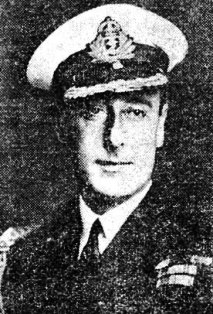 Lord Louis Mountbatten, until now British Chief of Combined Operations and before that commander of the British
aircraft carrier Illustrious, has been named Supreme Commander of the new Allied Southeast Asia Command.
Lord Louis Mountbatten, until now British Chief of Combined Operations and before that commander of the British
aircraft carrier Illustrious, has been named Supreme Commander of the new Allied Southeast Asia Command.
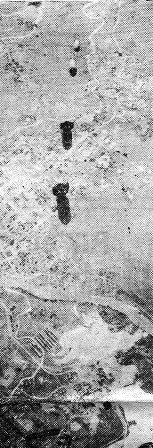 Four little bundles from heaven wing their way toward the Sons of Heaven occupying Namtu. They were dropped
on July 21 by one of our own 10th Air Force B-24's.
Four little bundles from heaven wing their way toward the Sons of Heaven occupying Namtu. They were dropped
on July 21 by one of our own 10th Air Force B-24's.
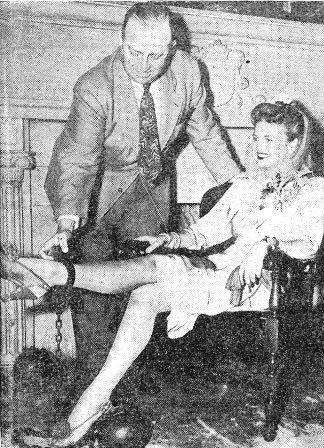 "Villain, unhand that dame," is probably what flashes into the mind of every red-blooded man in the C.B.I.
Theater when he sees the lovely pins of Lois Andrews encased in them cruel chains, while Warden Joseph F. Rager,
of the Illinois State penitentiary, makes a hollow attempt to pretend he's looking at the manacles. But
relax, chums. It's just a gag to plug La Andrews' current picture, "Roger Touchy, Gangster."
"Villain, unhand that dame," is probably what flashes into the mind of every red-blooded man in the C.B.I.
Theater when he sees the lovely pins of Lois Andrews encased in them cruel chains, while Warden Joseph F. Rager,
of the Illinois State penitentiary, makes a hollow attempt to pretend he's looking at the manacles. But
relax, chums. It's just a gag to plug La Andrews' current picture, "Roger Touchy, Gangster."
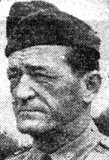
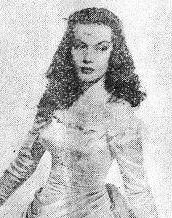 Glamorous Eve Whitney is doing her patriotic best to start a new style for evening gowns in order to save critical
material for other uses. We rise as one man to wish her luck in her venture.
Glamorous Eve Whitney is doing her patriotic best to start a new style for evening gowns in order to save critical
material for other uses. We rise as one man to wish her luck in her venture.
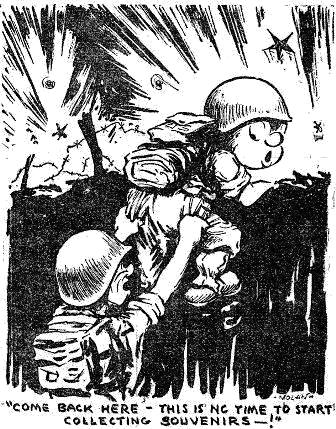

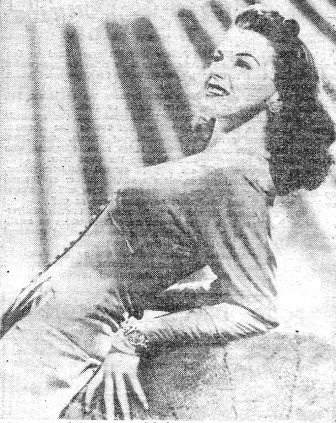 Whoever coined the gag about "she has a beautiful profile all the way down" could have been thinking of movie
starlet Marguerite Chapman. Those eyes... those lips... Those... Pretty, isn't she?
Whoever coined the gag about "she has a beautiful profile all the way down" could have been thinking of movie
starlet Marguerite Chapman. Those eyes... those lips... Those... Pretty, isn't she?
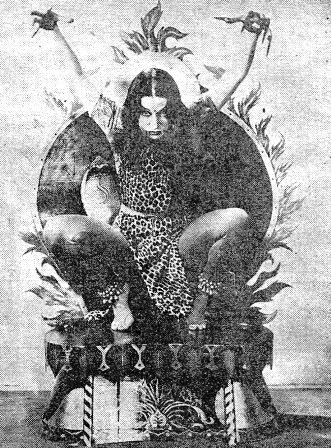 Partly for laughs and partly as a warning, the Roundup presents this touch of Indian local color.
Pin it up on the wall as a reminder of what the air around your bunk may be full of if you go too heavy on
the local joy-juice. Be informed, however, that the lady is strictly American and only interprets Indian
dance. She calls herself La Meri, but probably is one of the Jones girls from Brooklyn in real life.
Partly for laughs and partly as a warning, the Roundup presents this touch of Indian local color.
Pin it up on the wall as a reminder of what the air around your bunk may be full of if you go too heavy on
the local joy-juice. Be informed, however, that the lady is strictly American and only interprets Indian
dance. She calls herself La Meri, but probably is one of the Jones girls from Brooklyn in real life.